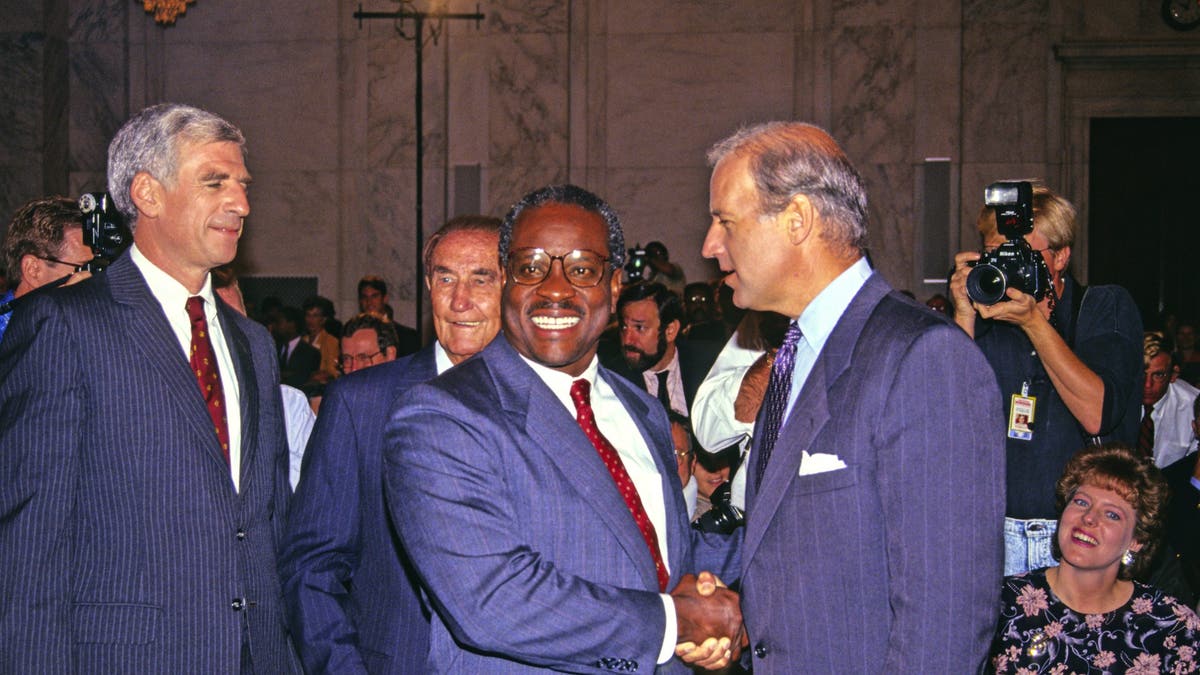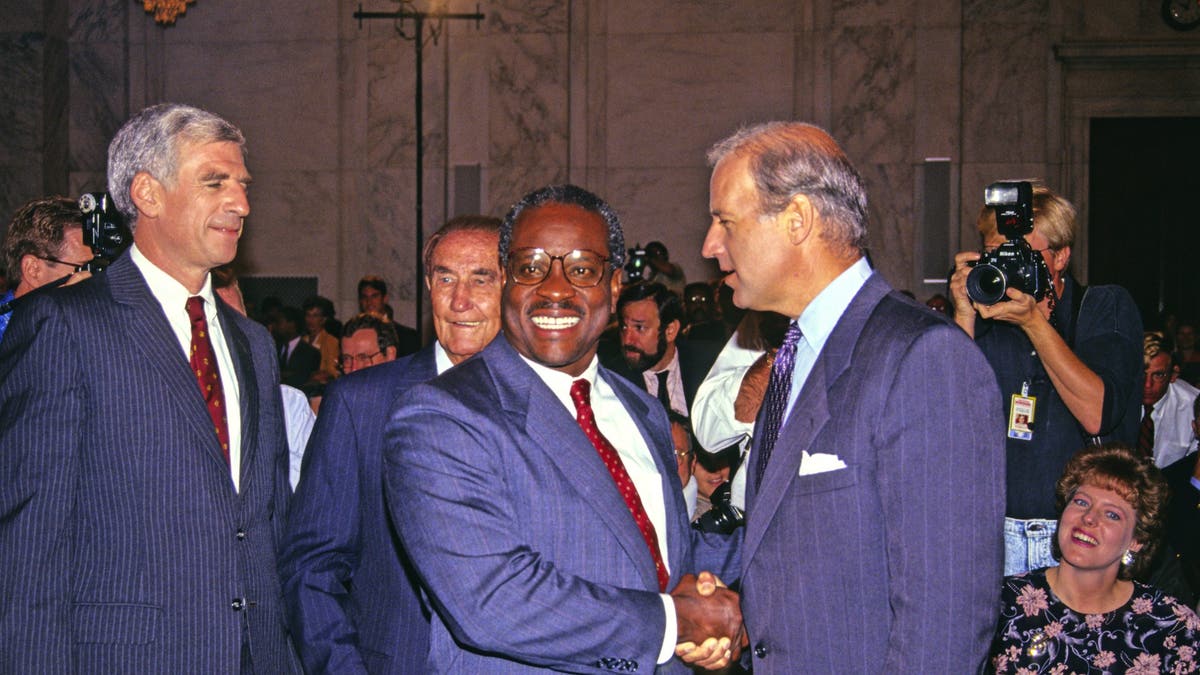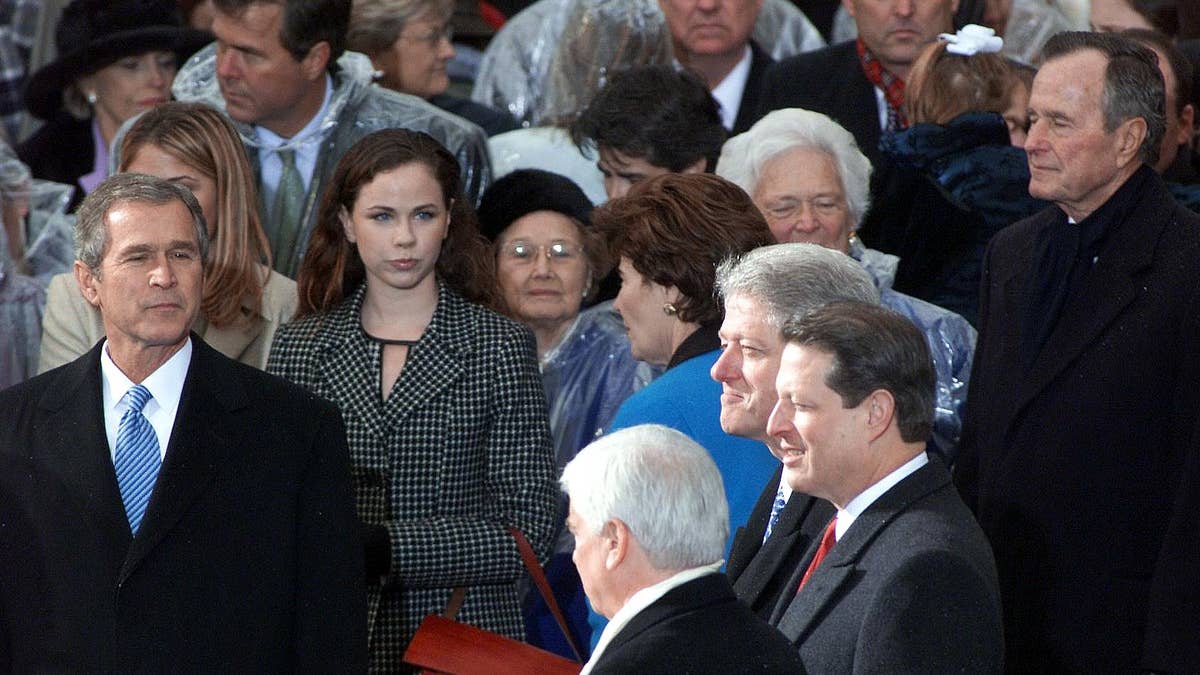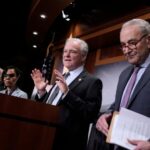
After the Supreme Court ruled presidents enjoy broad immunity in official acts, President Biden gave a speech lambasting the high court in a manner many observers considered unprecedented.
On Monday, Biden declared “I dissent” during an evening address responding to the court’s 6-3 decision favoring Trump and pro-immunity arguments.
“This nation was founded on the principle that there are no kings in America; each of us is equal before the law,” Biden said, calling the decision a “dangerous precedent, because the power of the office will no longer be constrained by the law…”
In its ruling, the court narrowed Trump’s potential culpability, saying presidents have immunity from prosecution over official acts within their “sphere of constitutional authority.”
STATE DEM LEADERS RALLY BEHIND BIDEN AFTER DEBATE
An analysis of presidential responses to Supreme Court decisions revealed a handful of prior examples, while experts Fox News Digital spoke with suggested Biden’s tack, however, is indeed unprecedented.
Mark Paoletta, who worked with Justice Clarence Thomas during his 1991 confirmation, called Biden’s attacks on the Supreme Court “dangerous.”
“Obama criticized a single case in his State of Union, which is bad enough, but Biden does a nationwide primetime address to trash the court on immunity… though he did not have the courage or perhaps the mental acuity to take any questions,” Paoletta said.
He added the president’s attacks on specific justices, including Thomas — regarding undisclosed trips — are similarly unprecedented.
“The last time Biden attacked Thomas, it did not go well for him,” he said. “After Biden tried to destroy Thomas during his 1991 confirmation hearing, Thomas delivered one of the most epic takedowns in history, calling the attacks led by Biden a ‘high-tech lynching.'”
Kyle Brosnan, chief counsel for the Heritage Foundation’s government accountability-focused Oversight Project, said President Biden’s behavior toward the court is unprecedented insofar as it is part of an overall recent ideological trend.
ECONOMY, BORDER, ABORTION DIVIDE BIDEN’S HOMETOWN AS RESIDENTS SPEAK OUT
“I see President Biden’s statements as another datapoint in a years-long crusade by the left to delegitimize the Supreme Court because they don’t like their rulings,” he said.
“[The Trump immunity decision] is a win for the office of the presidency and President Biden should be celebrating that he’s likely insulated from facing potential charges for weaponizing the Justice Department to go after his political enemies.”
Sen. Tim Scott, R-S.C., said last week that Biden “put a political target on the back of the Supreme Court” with his rebuke: “The greatest threat to American democracy today has just become Joe Biden.”
While appearing on Fox News Radio, George Washington University law professor Jonathan Turley discussed the president’s rebuttal, adding how he previously wrote that Biden is the most anti-free-speech executive since former President John Adams.
“The idea that [Biden] is really the symbol of constitutional fealty is really alarming,” Turley said.
Previously, during the State of the Union, Biden said Roe v. Wade “got it right” and derided Republicans seated before him in asking, “My God, what freedom else would you take away?”
CLICK HERE TO GET THE FOX NEWS APP

Clarence Thomas shakes hands with then-Senate Judiciary Committee Chairman Joseph Biden, D-Del., right, prior to a confirmation hearing in the U.S. Senate Caucus Room in Washington, D.C., on Sept. 10, 1991. (Arnie Sachs/CNP/Getty)
After the court handed down the Dobbs ruling, Biden publicly declared it part of a “deliberate effort over decades to upset the balance of our law” and a “tragic error” by the court.
He claimed the high court, for the first time in history, had taken away a constitutional right.
After Biden took aim at Dobbs during a NATO event overseas, critics like Rep. Kevin Hern, R-Okla., called it “unthinkable” for a president to attack another branch of the U.S. government on the world stage.
In 2010, after the Supreme Court sided with conservative advocacy group Citizens United in a case critics said opened the floodgates of corporate political spending, then-President Obama appeared equally incensed.
“With all due deference to the separation of powers, the court last week reversed a century of law that I believe will open the floodgates for special interests — including foreign corporations — to spend without limit in our elections,” Obama said during that year’s State of the Union.
In a rare but muted instance of criticism flowing in the reverse, Justice Samuel Alito was seen mouthing “not true” while Obama uttered the sentiment.
Sen. John Cornyn, R-Texas, told CNN at the time that Obama’s behavior was “a little over the top.”
In 1974, while embroiled in the Watergate scandal, President Nixon invoked the landmark New York Times v. Sullivan decision, which ruled public officials face restrictions in suing news outlets for defamation.
In his White House address, Nixon called out a “constitutional problem,” claiming some attorneys interpreted the case to be a “license to lie” about politicians or their family.
“This is wrong. It is necessary that a change be made so that a candidate who runs for public office knows that he has recourse in case of such an attack which is totally untrue and would otherwise give him a right to sue for libel,” Nixon said, warning the situation dissuaded good men from running for office.

Presidents Bush and Clinton, and outgoing Vice President Al Gore (TIM CLARY/AFP via Getty Images)
Outside of Biden, Obama and Nixon, presidents have largely appeared magnanimous while accepting a political defeat brought about by a Supreme Court decision.
The most iconic example is that of former President Clinton, who, while on a trip to North Aylesbury in England, appeared to graciously accept the fact his vice president, Al Gore, would not defeat then-Texas Gov. George W. Bush in the 2000 election.
A divided nation, replete with “hanging chads” and the so-called “Brooks Brothers Riot,” could be brought together by the deference shown by the candidates following Bush v. Gore, Clinton said.
In a 5-4 decision, the Supreme Court ruled Florida’s recount should be halted, reversing the Florida Supreme Court’s prior order.
“[T]he essential unity of our nation was reflected in the words and values of those who fought this great contest. I was proud of both [candidates],” Clinton said, pledging support during Bush’s transition.
Gallup polling from December 2000 showed Clinton ultimately gained six points in his approval rating.
The White House declined comment on the overall characterization.
Fox News’ Ryan Rugani contributed to this report.






